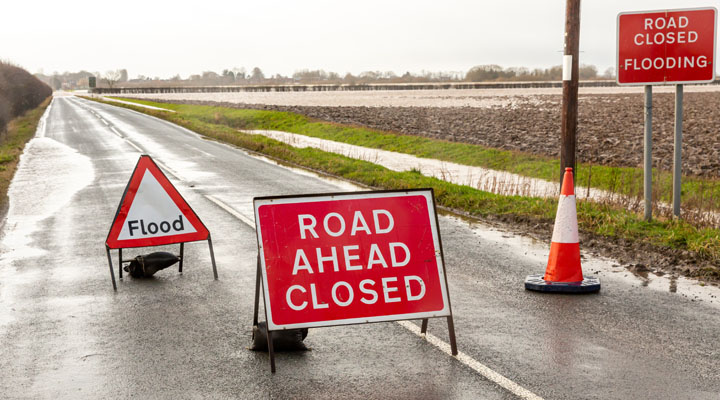
In Pakistan and India, temperatures this week have exceeded 52 degrees Celsius (125 degrees Fahrenheit). Being in Delhi, Rajesh Joshi told Radio 4’s PM programme, “was almost like walking through a hot furnace”. In Mexico, which has recently experienced record temperatures, the national water commission expects 70 per cent of the country to be in drought and the remaining 30 per cent to be in “severe drought”. The US, where millions face “dangerous heatwaves”, is braced for an “above normal” hurricane season.
The UK, which has seen record rainfall over the last 18 months, is now facing a heatwave (not that there is much sign of that as I write). We will have to live with the extreme weather fluctuations predicted in all climate models and pay the costs of adaptation.
(As ever, thanks to the invaluable Carbon Brief for most of these examples.)
Environment is only being discussed in relation to the economy
With this backdrop, one might expect climate and the environment to be an election talking point but, to the extent it features, it is being seen through the lens of economic competence and the cost of living. The prime minister has posed a choice between prioritising “energy security and your family’s finances” (Conservatives) and “environmental dogma first” (Labour). Claire Coutinho, the climate secretary, says Labour’s plans are to “lump families with unnecessary bills they cannot afford”. Neither explain why relying on foreign gas is better for energy security than shifting to home grown energy and improving the housing stock.
Labour has come out with a strong response. Launching Great British Energy, it argues that the ban on onshore wind, cuts to energy efficiency programmes and last year’s failed offshore wind auction have increased household bills by hundreds of pounds a year, while reducing the UK’s energy security.
Sir Patrick Vallance’s endorsement of Labour’s plan to decarbonise power by 2030 is compelling: “If Britain takes a lead we can be the innovators and implementers, and both help ourselves and export solutions to the world…. Getting to a clean power system fast and with appropriate technologies is an investment, not simply a cost.”
The level of debate has been depressing
It is good to see Labour focusing on energy and climate policy, a brief respite from its apparent obsession with pre-emptively stamping out any possibility of dissent should it come to power (getting the bunker mentality in early). But, for the most part, the election debate has been depressing, with both of the main parties indulging in “fantasy economics”.
At some point, whether during the campaign or in the next parliament, all the parties will have to find answers to three big questions.
First, the UK has a low investment, low productivity, low growth economy. Our problems are longstanding and have been exacerbated by austerity and Brexit. How can we get the investment the country needs to restore growth and improve productivity? The Conservatives think it is best done by cutting taxes, but they have little room to do so. Until recently, Labour espoused a version of Bidenomics, but their emphasis now is on stability and tight fiscal rules. Great British Energy looks like part of the answer, but so far neither party has set out a compelling answer to the country’s deep economic problems and neither seems likely to capitalise on the “growth opportunity of the 21st century”, net zero.
Second, how do the parties propose to meet legally binding climate targets and the UK’s 2030 NDC (the nationally determined contribution under the Paris climate agreement to avert climate breakdown)? Labour’s plans on energy are clear and ambitious, but on the biggest carbon gaps – transport, heat and buildings, and land – there is little detail, so far, from any of the parties.
Third, how do the parties plan to meet the country’s nature targets? These are demanding: to halt the decline in species abundance by 2030 and, harder still, to conserve a minimum of 30 per cent of land and sea for biodiversity by 2030. The Liberal Democrats have pledged £1 billion extra a year for farmers. There are few details, the commitment is presumably consistent with existing policy papers on nature and farming, which set out a pretty clear plan. I am aware that the less likely a party is to win power, the easier they will find it to pledge money, but the other parties should set out their plans and how they relate to their policies on farming and the regulation of the water industry.
There are, of course, umpteen other questions environmentalists will want answered in the course of the campaign, but we really need answers to these three. Fortunately, we have weeks more of the campaign to enjoy.
Discover more from Inside track
Subscribe to get the latest posts to your email.
- SEO Powered Content & PR Distribution. Get Amplified Today.
- PlatoData.Network Vertical Generative Ai. Empower Yourself. Access Here.
- PlatoAiStream. Web3 Intelligence. Knowledge Amplified. Access Here.
- PlatoESG. Carbon, CleanTech, Energy, Environment, Solar, Waste Management. Access Here.
- PlatoHealth. Biotech and Clinical Trials Intelligence. Access Here.
- Source: https://greenallianceblog.org.uk/2024/05/31/three-big-questions-the-parties-must-answer-soon/
